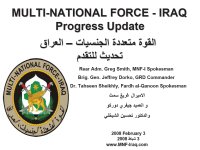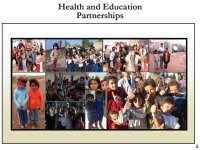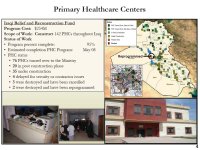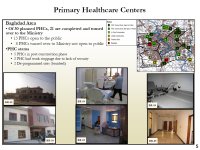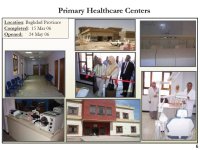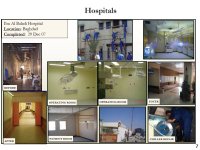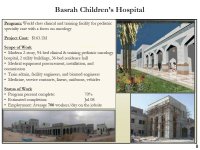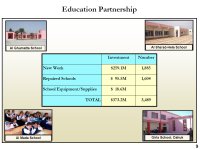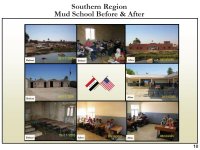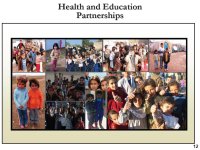
PRESS CONFERENCE: Rear Adm. Smith, MNF-I; Maj. Gen. Askari, MOD: Feb. 6, 2008
Multi-National Force-Iraq
Rear Adm. Greg Smith, MNF-I spokesman, makes a statement regarding the recent market attacks in Baghdad; Brig. Gen. Jeffrey Dorko, commander of the Gulf Region Division, U.S. Army Corps of Engineers, and Dr. Tahseen Sheikhly, civilian spokesman for Operation Fardh al-Qanoon, discuss progress on reconstruction and services, Feb. 3, 2008.
PRESS CONFERENCE:
Rear Admiral Gregory Smith, Director of Communications, Deputy Spokesman, Multi-National Force – Iraq
Dr. Tahseen Sheikhly, civilian spokesman, Operation Fardh al-Qanoon
Brigadier General Jeffrey Dorko, Gulf Region Division Commander for the United States Army Corps of Engineers
Dr. Hassanein Malow
DATE: February 3, 2008
TRANSCRIBED BY: SOS INTERNATIONAL, LTD.
PARTICIPANTS:
RDML SMITH
DR. SHEIKHLY
BG DORKO
DR. HASSANEIN
REPORTERS:
REPORTERS 1-8
HANS MELISSEN, RADIO NETHERLANDS
GARRETT THEROLF FROM THE LA TIMES
*REP1 = REPORTER 1
*INT = INTERPRETER
RDML SMITH: Good afternoon. As-Salāmu `Alaykum. I have just a few comments to make this afternoon. Then I will turn to my two colleagues for their presentations on efforts by the government of Iraq and the coalition to rebuild this war-torn nation. First of all, on my behalf of the men and women of Multi-National Force – Iraq, I want to join the Iraqi people and their government to express our condolences to the families and friends of those who lost loved ones in Friday’s barbaric attacks on two Baghdad markets. We also reach out to those who suffered injuries. We share the outrage expressed by civic and religious leadership throughout the world, and we condemn al-Qaida in Iraq, who is responsible for these attacks. This indiscriminate violence targeting families enjoying themselves on a holy day again shows the true nature of al-Qaida and the barbaric enemy facing the Iraqi people. We will work closely with the government and security forces of Iraq to hunt down those murderers behind those tragedies and to assist in making sure they face justice. The continued use by al-Qaida of Iraq’s most innocent – its children, women, and even the mentally challenged – shows the broken ideology, the desperation, and the depths al-Qaida will go in this attempt to destroy the bright future of Iraq. Despite all this tragedy, the people of Iraq are fighting back and standing up to al-Qaida and other extremists. They are taking back their neighborhoods, reconciling their differences, rebuilding their schools and hospitals and forging a way ahead free of intimidation, corruption, and violence. Today, I am joined by two leaders who are working to make sure the people of Iraq receive all the support they need to fulfill their dreams of a new Iraq. Dr. Tahseen Sheikhly is the Operation Fardh al-Qanoon civilian spokesman. And Brigadier General Jeffrey Dorko is the Gulf Region Division Commander for the United States Army Corps of Engineers. Together they will discuss efforts to ensure the Iraqi people have reliable electric power, safe drinking water, sewage facilities, and other essential services. They will discuss improvements in health and education as well as plans to build upon these achievements. Upon their remarks we’d be happy to take your questions. First up, Sheikhly.
DR. TAHSEEN: Shukran jaziilan. Shukran jaziilan, Admiral Smith. Speaking in Arabic.
INT: Always sympathizes with us and always shows affection to the attacks that happened recently. As the first anniversary for the Operation Fardh al-Qanoon approaches, and as you know, we established security and stability in Baghdad. The good environment for providing the essential services was one of the main goals that have been achieved because we are now providing the right and the essential services after we surpassed all of the security problems. The civilian side increased or showed some increased challenges that the nation is facing in the essential services provided to the citizens and all the aspects. However, the persistence and determination is one of the main things that is characterized by the loyals who work with us in this country. So after every destruction there was a reconstruction because the evil power worked to demolish everything in this country, but the good men are trying to rebuild and reconstruct this country again. And we can say that the evil cannot last for long. Many of the governmental institutes faced many problems and dilemmas during the past few months during Operation Fardh al-Qanoon. And many places in Baghdad there was no chance to provide essential services due to the chaos and problems there. And after the security has been improved in those places and most of the places in Baghdad, there is an ability to provide at least, or we can assess as one of the major services according to our own abilities. And we will also talk about sewage and electricity. We will talk about health and education mainly today, and also the efforts of the Ministry of Health and Ministry of Education in providing services during the past period. On the efforts by the Ministry of Education we have to remember that there hasn’t been any school, no school was built in 1986 despite the growing number of the…we haven’t seen any reconstruction of any school since the 1987 despite the growing numbers of the students. We have over 2,800 schools in Baghdad while the schools that we have over 8,200. And we have 560 buildings that we lack actually now. And sometimes we see that some buildings and some schools contain too many students. We have over one million students and they also occupy all those buildings and schools. And the Ministry of Education and through past year only, because the previous years and the allocations and the budgets for building the schools were not that good. But in 2007, there has been a good allocation for money to renovate and also build schools. The Ministry of Education managed to renovate over 1,060 schools in Baghdad, over 235 were in Baghdad. The coalition forces also helped in renovating some schools in all over Iraq. And General Dorko will talk about this now. The Prime Minister is really paying attention to the education and is so keen to that. And in his recent meeting, he said to overcome this problem he formed a committee from the Ministry of Education and also from the municipality of Baghdad and the Baghdad Provisional Council to make a national campaign to renovate all the schools and at least the buildings so that they can cover the real need we have now. We have some solutions, some immediate solutions that is presented by building more classrooms inside the schools until the main other classrooms are being built. And so there’s a national campaign to renovate the schools. We have also the director of the schools Hassanein Malow, and he will also answer some questions regarding the building of schools. As for the Ministry of Health and the things the ministry provided during the past 11 months during Operation Fardh al-Qanoon in Baghdad that are 39 big hospitals, 11 in Karkh district and 23 in Rusafa and fiveinside the medical city. And we have 13 medical centers in Baghdad, seven in Karkh and six in Rusafa. We have over 176 health care centers, 84 in Karkh and 89 in Rusafa and three inside the medical city in Baghdad. We also have 33 specialized centers, nine in Karkh and 18 in Rusafa and six inside the medical city in Baghdad. And we have also 99 public health or clinics in Baghdad. Most of those institutes never provided services in 2006. As Operation Fardh al-Qanoon started and as the security has been improved, those institutes started to restore its services and also provide more services to the Iraqi citizens. The major operations that have been conducted during the past period which is due to the security improvement which was not happening previously is over 10,460 operations that have been conducted in the hospitals in Baghdad, 3,000 operations in al-Karkh and the rest in al-Rusafa. And we have 2,900 in the medical city. The major operations where over 35,000…7,400 in the hospitals in Karkh and 22,800 in Rusafa, and over 5,531 at the medical city in Baghdad. The medium operations were 30,000 operations. The minor operations were about 45-46 operations, and the people who visited the emergency rooms and hospitals reached four million visitors, or persons. Those who went to the public health clinics were about two million people. The sick people that are now inside the hospitals until last month the number was 1,420. And we have over one million sick people also went to the clinic…health. Of course, the talk about the services is not as we aspire. But of course we have to know that these numbers that I told you now, these numbers would have never achieved had there been any efforts in the past. If you compare those numbers with those in 2006, you will find that there is a huge difference that is over 70% if we count the number of operations, the major or the minor operations done inside the hospitals. And this proves that Operation Fardh al-Qanoon managed to provide a good environment to provide the services to the people. Those are actually much less than we hope and aspire. And we should know that most of the places in Baghdad was neglected due to not providing the services in those places, and that’s why many places in Baghdad, the electricity, the power lines were damaged. In many places in Baghdad, there were no services for removing the trash there. Over in al-Gazahliyah, we removed tons of trash so that we could provide other services to those places. We sent over 400 generators in those neighbors and also we provided services also to some places that lacked the powers. And we do know that the share of Baghdad of electricity is linked to the crisis of electricity inside Baghdad. We need over 8,000 megawatts, and our production does not exceed like 4,000 megawatts. So we need another 3,000 megawatt to the other provinces. And Baghdad only takes 1,000 megawatts. That’s in the best cases. That’s why we need to distribute this to all the places in Baghdad. However, this is linked to many circumstances, and this is…I don’t know want to talk about the other services, because we need to focus on health and education. However, I’d like to thank the efforts of the coalition forces that contributed, really, in supporting the effort of the Iraqi government in building and renovating the schools and health care centers which is a good, essential things. One of the major needs in the Iraqi society. Thank you.
RDML SMITH: General Dorko, please.
BG DORKO: Good afternoon, everyone. I want to thank Admiral Smith for inviting me here today to speak. And I really appreciate the opportunity to be here with my colleague Dr. Tahseen Sheikhly to talk to you about progress that has been made across the country, specifically in the areas of health and education. Before construction began in 2004, the US government worked with the government of Iraq to ensure that all reconstruction projects – in this case health care and education – would be built in areas where it was most needed to provide those services best to the people of Iraq. Next slide.
We work closely with the Ministry of Health and the Ministry of Education to ensure the projects are working to fit the needs of the country. Once we complete a project, the ministry inspects it before transfer takes places. This is an overview of the number projects we have undertaken in the health care and education sectors. The Gulf Region Division of the Army Corps of Engineers works closely and on a daily basis with each of the ministries. And it’s this great partnership that has allowed us to make the progress. Next slide.
The $254 million worth of primary health care center program is one of those successes that I mentioned before. We began this program two years ago, planning 142 new clinics to augment the existing system of clinics in Iraq. We collaborated with the Ministry of Health in the construction of the sites and in designing three specific types of clinics. As of today, we have completed 76 provincial health clinics, and 20 more are in post-construction phases, which means they’ll be completed within the next few months and completely outfitted with equipment. There are four clinics that have been delayed for security or contractor issues that either involve work stoppages, which we are correcting with the construction contractor, or repairs of relatively minor damage that in some cases has been caused by explosions that occurred near the clinics while they were under construction. There were five clinics that were nearly totally complete when they were destroyed, and there were insufficient funds in our budget to rebuild them, so they were canceled. Two additional clinics that were destroyed had enough funds remaining so that we will be able to go forward and rebuild them. And as you can see from these numbers, we’re nearing completion of the program. We work closely with the Ministry of Health to identify and correct deficiencies and to coordinate the installation of equipment before each of these clinics is turned over. The 20 clinics listed in post-construction phases are undergoing those actions right now. When designed, each of these clinics is expected to serve approximately 110 patients a day. However, open clinics are generally seeing upwards of 300 patients, or even more, every day. Clearly, these facilities are meeting a great need in the neighborhoods that they’ve been built in. Next slide.
In Baghdad, we have completed 21 of 30 planned health clinics, and are in the post-construction phase on an additional five. Next slide.
This slide is an example of what you can expect to see at one of the new health clinics, a solid, inviting exterior and a clean, modern interior with dental, laboratory facilities, and everything needed to take care of patient needs on a daily basis—or immediate patient needs. Next slide.
Another area in which our partnership is improving is health care for all Iraqis in the hospital sector. Our $288 million program includes 25 renovation projects at 20 hospitals that focus on children’s and maternity care. We’re also construction two new hospitals, one in Basra, and one in Mayson province. Currently, we have completed 17 of the projects, and the remaining eight renovations are expected to be complete by May 2008. Even al-Baladi hospital renovation in Sadr City, shown here, was completed at the end of December. We’re finishing final items, and the cooperation of the doctors and staff with the construction crews was exceptional. This renovation took place while the hospital continued to operate. It’s a very busy hospital, seeing approximately 200 people every day, 80% of them children, according to the hospital staff. The facility has a bed capacity of 200 patients, and is delivering between 30 and 40 newborns aday. We renovated the building and made upgrades to patient rooms, operating rooms, plumbing and cooling systems. Next slide.
One of the new facilities is the Basra Children’s Hospital. This $163 million hospital is designed to care for children with cancer and to train doctors in their care. The project is very complex, not only because of the technology and the challenges involved in building a hospital, but also because it is being built using US and United Nations funds. Further, medical equipment that will be installed in this very specialized hospital is being donated by Project Hope, an international philanthropic organization. The project is about 70% complete, with an estimated completion date of July 2008. Approximately 700 workers are employed daily at the job site to do the work. From July through November, the medical equipment will be installed, tested, and commissioned. We anticipate the hospital will be ready to go into operation in early 2009, making it the first new hospital in Iraq since the 1980s. The Basra Children’s Hospital project requires not only close coordination between GRD and the Ministry of Health, but also with local security forces to ensure smooth access for materials and our workers and with other ministries such as the Ministry of Electricity in providing connections to meet the power requirements. We are also providing the Ministry of Health with $12 million for health care training to ensure medical personnel have the knowledge to properly work the new equipment. And we also look forward to the completion of the Academy of Health Sciences building, now under construction here in the International Zone. This center will allow for a full spectrum of training for clinic and hospital staffs. In addition we are providing the Ministry of Health 50 maintenance vans and maintenance repair sets that go in those vans, valued at $12 million and a one-year maintenance support contract for the provincial health clinics. This will ensure that the ministry continues to have the tools and expertise needed to keep all these health clinics and hospitals up and running for the neighborhoods and the people they serve. Next slide.
Now, I’d like to transition to another great working partnership we have with the Ministry of Education. The Ministry identified its priority requirements in an inventory of more than 20,000 schools nationwide that it deemed that needed work, and the US government stepped in to assist. Major construction and renovation projects were conducted, first by the US Agency for International Development, and then by the Gulf Region Division. Smaller scale projects are usually identified by local authorities, and have been addressed by coalition commanders using their emergency response program funds. It’s not easy to break down the details of the $373 million worth of work done. As you can imagine, it falls into many categories, so we’ve broken it down into the number of individual schools affected and the money involved in three broad categories that are shown on the slide. New work, which involves completely new schools or substantial additions to schools, repaired schools, referring to renovations associated with existing buildings, and then finally providing supplies and equipment. And you can see the numbers as represented here. Next slide, please.
In Baghdad province, GRD has completed 113 school projects. In some of the southern provinces, many of the schools had dirt floors that turned to mud during the rainy season. There were dark classrooms, inadequate supplies that made learning very, very difficult. And you can see the differences in the “Before” and “After” photos in this slide. Next slide, please.
This slide is an example of another type of school we’ve worked on, a training school for teachers. The provincial reconstruction and development council continues to work on the school program, coordinating between the Department of State’s Provincial Reconstruction Team and the Provincial Council, as well as the Commander’s Emergency Response Program that I mentioned to you earlier to complete this particular project. Next slide.
Finally, as Dr. Tahseen said that we’ve accomplished a lot in our partnership, but there is still so much to do. We realize that. And our goal is not just to leave behind bricks and mortar, but to leave behind knowledge and capability as to how best use this infrastructure to the benefit of the citizens of Iraq. This is a great nation that’s great and rich in natural resources. But obviously, its finest resource is its people. And we’re here to partner with those incredibly talented engineers, their managers and leaders, and the Government of Iraq, like my colleague, to ensure that we get it right in providing the best infrastructure to serve the people of Iraq today and for decades and generations to come. Thank you.
RDML SMITH: Thank you very much. We’ll be happy to take questions on education, on hospital programs, and of course, any other subject you have today. All the way back there.
REP1: Asking question in Arabic.
INT: We’d like to ask about the schools that have been renovated by the American side. Could you give us a picture of the schools that have been renovated by the American side?
DR. TAHSEEN: Speaking in Arabic.
INT: Well, I can answer something. The efforts of the coalition forces in renovating those schools is driven by the good intentions. The idea of going to contractors we know that…it’s our job to follow up with those contractors. However, now we have some good coordination centers. All the contracting offices happen through sitting on one table and planning on all the projects together. And I think Mr. Hassanein could also clarify more about this.
DR. HASSANEIN: Speaking in Arabic.
INT: Thank you Dr. Tahseen. Regarding your question, I’d like just to give an introduction to what happened to the schools, and I think this will give you a better idea. In 2003, after the Ministry was established, we made a full scan in Iraq on all the provinces. We had over 19,000 schools. And we had 15,000 buildings for those, so we have a shortage in the buildings. If you remember, the first ministry was formed in late 2003, and during the first six months, the coalition forces and the American side renovated over 2,500 schools, because there was no Iraqi Ministry of Education at that time. After the establishment of that ministry and until now, I can give you a number that you want. But to give a clear picture, there are over five sides that contributed to this, in addition to the coalition forces or the multinational forces or the nongovernmental. In addition also, we have the provincial councils. So the Ministry of Education after it was established, or before 2003, the Ministry had no…or special to us only education in that building. And now, and due to the shortage that we have in the buildings, especially in schools and education, this is a really disaster to have such a shortage that is over 4,000 schools. That’s why the Ministry of Education decided to establish the directory of the schools in May 2004. And during those years, the budget that was really good for the Ministry of Education was in 2007, and it reached over 260 billion Iraqi dinars. But for the past other years, the budget was really bad. In 2004, we had over 10 billion dinars, meaning you can just build one or ten schools, if you say a school costs only one billion. In 2005, the budget was 13,000 billion dinars. In 2007, the number of the budget was really good, which was 260 billion Iraqi dinars. We were able through this budget to build 284 schools, and we also hope in the future that we can build more schools. So, I think this is an answer for your question.
REP 1: [Unintelligible]
DR. HASSANEIN: The schools after 2004 there was no Iraqi side to supervise the performance of building those schools. But with help from the coalition forces, or without the coalition forces we never would have had any schools after 2004. However, but now the Iraqi and American side are working hand in hand.
REP2: Asking question in Arabic.
INT: Question to Dr. Tahseen. The Ministry of Higher Education…those ministries have been plundered and sabotaged after the war.
DR. TAHSEEN: This compound, or this complex includes the Ministry of Education, the Ministry of Minerals, and it never actually undergone any sabotage during the military operations. But also suffered sabotage due to the plundering after the 2003. The Ministry of Industry was able to renovate its building and also remove its ministry from its place to this new other place. We have also another two ministries that should also have their policies. Prime Minister Maliki, for weeks, he said that the Secretary of the Ministry of Council should deal with those two buildings of the ministries. Those ministries are becoming safe havens for the terrorists and also for outlaws, and also becoming a safe place for people who could harm the society and the people. Those empty buildings are actually a burden and a problem on the security side, not only on the ministry itself. However, I have not seen intention by the Ministry of Education to renovate or move to those new places or empty buildings. The Secretary of the Council of Ministers is following up this, and I think in the coming few weeks with passing the budget, there should be some allocations to renovate the empty buildings. And each ministry in 2008 will be responsible on its own building that was plundered or sabotaged.
DR. HASSANEIN: A question about education. As for the compound that you mentioned, it’s not easy as Dr. Tahseen said. This is different from the Ministry of Industry. The compound of the higher education, it’s a building of 11 stories that is combined in one. This building was not destroyed during the war, but after, and that is due to the sabotage, and was burned completely. We spent a lot of money just to remove the trash from it. The problem in this building is that it’s not like the other traditional buildings. It doesn’t have any windows, actually, what is called the package unit. It has a central cooling and central heating. And the system is so complicated because the company that built it is a Japanese one. And in 2004, we asked through negotiations with a representative from that company and all this was done by the Ministry of Education. So, we reached a state that we hope this company comes back again and renovates this same building. But it seems that there was an issue or a resolution that Japan cannot send engineers or technicians to Iraq, but only can send supplies. That’s why it was delayed. After that the whole thing was passed over to another advisory council because the building is not a traditional one. The recent thing that we done in the last year is that all things were presented to the advisory office board, and we are also looking for funds and help from other international countries.
MELISSEN: Hans Melissen, Radio Netherlands. I have a question concerning electricity in the city. I haven’t been here for two years. I came in last week and I see the dark city in the evening. How many years do you guess will it take before Baghdad has a normal 24-hour working electricity system?
BG DORKO: Sir, right now, the Ministry of Electricity has a plan. When we came in here, the coalition work that was initially done was to help jumpstart the system in partnership with the Ministry of Electricity to bring in new generation. It’s not just a matter of bringing in new generation, it’s the transmission and distribution system that creates stability to go out and allow the network to exist and everybody to have to be on par with the power. There is additional generation that’s going online all the time in terms of gas turbine generators. And there are plans to build bigger plants. But at the same time, as we increase the production of electricity, there’s an increasing need out there for electricity. People are buying more electrical appliances, which I think speaks well to their confidence in their surroundings and the fact that they’re able to buy things which put an increased demand on the system. And so now there’s an increasing demand that the supply is going after now, and we’re trying to close that gap. The Minister of Electricity has a plan to do that, but as you probably well know in the electrical sector that long lead time items are needed. Big power system components take sometimes a year or two years to purchase. They have to be constructed, and they have to be designed for the specific application. And so, I think it’s still going to be a number of years yet before there’s 24 hours worth of electricity in Baghdad or around the country. And right now, the Minister of Electricity is working to get as much production online as he can to create a stable system that allows him to distribute it equitably.
MELISSEN: Ten years?
BG DORKO: Ten years? I guess it’s a matter of what demand is in ten years. If demand goes up, I don’t know if you can predict supply. It will be a number of years from now until, even if there were just flat demand right now for supply to catch up. But all the time demand is increasing at some pace.
MELISSEN: If demand would stay the same, it could take ten years?
BG DORKO: I don’t think it could ten years. I think it would take less than that. But again, it depends. There’s so many variables here. If a large transformer or a construction of a large….a large thermal power plant that would be 1,200 or 1,600 megawatts of power is pretty substantial. A large plant like that would take three or four years to build. And I know the minister has plans right now to contract for and have three or four or more of those large plants built in the country. But even if you were to start today in ordering the equipment to do all the construction and install it, for those alone would take three or four years to get the initial wave of plants online.
BROOKS: Brad Brooks for the Associated Press. Question for the general. Following up on the electricity question there. I’m curious. We hear from provincial leaders that there’s a real problem in the bureaucracy of trying to build plants at the local level when they’re dealing with the central government. Is the Corps involved at all on that side of these projects in trying to help streamline the bureaucracy so that it doesn’t take so long for say a local plant in one of the provinces to be approved and to start construction?
BG DORKO: Not so much directly in those particular procedures. Our role to this point is there’s been a construction role where we’ve gone in and improved transmission, distribution, but in particular, generation in bringing generators in and establishing them in new power plant configurations or inside of existing power plants. We provide advice to the ministry. There are technical experts that are here that are not just part of GRD, that are part of the US government effort here that’s providing technical advice to the Minister of Electricity on the further development of the system. In terms of the specific procedures that are ongoing down in a province or in a particular municipality, there are lots of complexities that involves the switching system and how distribution is made through neighborhoods and how loading is shed at times when load increases. And the procedures for doing that are determined by the Ministry of Electricity, I think, in partnership with the local municipalities that are involved there. So we don’t get involved in the specific load shed planning that goes on down in the individual provinces or communities.
REP3: Asking question in Arabic.
INT: Question to Dr. Tahseen Sheikhly. Operation Fardh al-Qanoon achieved some good results. However, as you said, the services that you provided is nothing compared to what….do you have any other plans in the future, especially that we have been told that this year is a year of reconstruction?
DR. TAHSEEN: Speaking in Arabic.
INT: We have to know that the essential services is provided with the security. Providing security needed some time, and establishing security took time. And we also need to bring back to the people who provide the services, and we need to bring back the confidence in those people so they can work on providing the services. Many of the employees in those institutes sacrifice. So that we push them to work. We also needed some time to…however, the services now, I’m not saying that they’re really in a good way. However, there is a good environment to provide the services. Now, that is. When we provide services in places that actually suffered from instances like sewage problems or trash or even problems in the clean water or electricity. So, when we provide services, we need to work on the infrastructure that is really in those places. I can’t tell you that I can pave a street without even fixing the infrastructure in those places. I can’t also work on the pavement without even working on the water system there. Many of the water system distributions are really old and go back to the fifties. And all those need some renovation. So, to provide those services gradually and step by step, we need some efforts. You know building a room could take one, two, three weeks. So, what if you come to the idea of building those old networks. The mayor of Baghdad and also the governor of Baghdad said that their plan for 2008 is about a $1 billion that is allocated for investment and also reconstructing Baghdad in 2008. And in another press conference with our friends Admiral Smith and also General Dorko, we can also provide you some other details about the projects that will be done in 2008 in Baghdad.
REP4: Asking question in Arabic.
INT: From the Anbar News Agency. Question to Dr. Tahseen Sheikhly. There’s a school in Babil provinces. It’s really an old school, and there are some threats to remove this school, and there are some disputes about the property of this school between the Ministry of Education.
DR. TAHSEEN: Well, you posed the question that is outside Operation Fardh al-Qanoon. However, we have Dr. Hassanein. He is responsible for the buildings in all of Iraq. And I think he could answer this question in a much better way.
DR. HASSANEIN: You’re talking about the transition of property?
REP4: Speaking in Arabic.
INT: The Ministry of Education does not pay attention for this intermediate school, despite the fact that there some threats facing the teachers.
DR. HASSANEIN: You should go and ask the Minister of Education about this, but I’d like to just give you one idea. The Ministry of Education in 2007 went outside. That was the first time the Ministry of Education sent delegations to the other provinces, and that is due to the fact that the budget was really good. The budget in the previous years were not really that good. As for your question, I think you should address the Minister himself about this.
REP4: Speaking in Arabic.
INT: I have the documents about this. I have the documents and it was presented to the Minister of Education. And this also has to do with the Operation Fardh al-Qanoon. You avoided answering the questions.
DR. TAHSEEN: No I did not. I’m focusing about Baghdad, not Hillah.
REP5: Question to the spokesman and to the commander. Two days ago, I was just in a hospital and the chief doctor there showed me children with cancer, and told me cold-blooded that these children would die. Now you are telling here there are millions for hospitals to be given. I just want to ask, there are not enough doctors in the country. Only three psychologists are in full Iraq, he said to me. The doctors are afraid. They are going out of the country. How are you going to provide the people the health when the doctors get out of the country?
DR. TAHSEEN: Speaking in Arabic.
INT: Of course, we know that terrorism did not target only the infrastructure in the country, but also it targeted the scientists, the doctors, and all the middle class that is capable of building this country, because the accumulation of skills and science is really at this level of middle-class people. The medical sectors suffers from many doctors outside the country who’ve traveled. And this is true. But at the same time we have so many doctors that did not wish to provide services and they are inside the country. Now they are going back to provide services inside the country. And there are many places in Baghdad. And the case that you witnessed, I think, has to do with another subject that does not have to do with the doctors but has to do with the medicine. And we have a shortage in the medicine that is provided for those cases. The best thing that we were able to provide in 2007 was 30% of the need in medicine. And this is really a humble number. We need much more than that so that we can save the people from such kind of diseases. But of course, this number will be increased and the services will be much better in the future.
REP6: Asking question in Arabic.
INT: Question to General Dorko. Do you have any plans regarding the water services? And what’s the problem of the shortage in the water in Baghdad? Does that have to do with the power outages in Baghdad?
BG DORKO: The system specifically to water supply could be affected by power because power is provided to pump stations that provide the raw water that goes to water treatment plants. And if there isn’t power available that can certainly affect it. And there are a number of smaller compact water units that have been installed that provide smaller amounts of water than a large water treatment would that are scattered around the country. In some cases, they’re hooked up to the grid, and if the grid fails or there’s a blackout or not power to supply electricity to that particular…it’s actually a miniature water treatment…that it won’t be able to provide clean water. In a lot of cases there are generators that support those particular small water treatment operations. So, power does have an effect. But also leaks in the system have an effect also when a waterline breaks and water leaks out of the system, that affects supply that’s available. And right now, it’s just the raw capacity of the water treatment plants that are in the city right now. I know there’s an ongoing program that Amanat Baghdad has to go around and do maintenance on the water treatment plants in anticipation of the needs, particularly in the summer when water needs go up to make sure that each of those treatment plants is able to treat water at or near their maximum capacity. And I know that the Amanat has a long-range plan to add water treatment capability to the city, to build more water treatment facilities and plants in the coming years to raise the level of treated water, of drinking water that’s provided for the city.
DR. TAHSEEN: Speaking in Arabic.
INT: Let me just clarify one point again. The water plant that we have in Tarmiyah we can operate that fully because the water system inside Baghdad is really very old. If you pump some water with big levels there could be some damages to those pipes or networks. We are facing a huge problem. And to provide water in a good way, we have to renovate the water distribution system as the general said. The municipality of Baghdad has a plan to renovate most of the water networks in Baghdad. And as you can see, there’s a lot of work that is being done in many streets in Baghdad, because we with cooperation with the multinational forces we are serving three things: electricity, sewage, and water. We’re working on those three major problems, and we’re giving priority to those three things.
REP7: My question to the general concerning the electricity. You know that there are a lot of generators in all neighborhoods in Iraq, especially in Baghdad as I’ve heard here. And you know the owners of the generators are costing people a lot of money because they have all these problems with the fuel. Why not this project is going to be adopted by the government and are selling the electricity to the people until they fix the problem of the electricity, temporarily at least. Thank you.
BG DORKO: You make a great point about when there are many small generators, then your problems are multiplied, because each of those generators require fuel, and fuel becomes another issue to be supplied to those generators. Obviously, the answer would be to replace those small generators with a large, centrally-run power plant that provides power. And I know that’s the Ministry of Electricity’s intent, to provide reliable power to both Baghdad and the rest of the country is to over time bring larger plants on board so that those smaller generators can be taken offline. I don’t know that I can speak to the economics right now of how individual generators in neighborhoods that are providing power to neighborhoods are getting the money to be able to buy the fuel and provide reliable fuel. I know both the Minister of Electricity and the Minister of Oil understand the need to provide a steady flow of fuel to those smaller generators that are providing power—much-needed power—in each of the neighborhoods right now, and are committed to work to make that work out right now the best they can while bigger plants are brought online to alleviate the need for those smaller generators to be there. It would be much more efficient to have bigger power generation plants or generators.
THEROLF: Hi, Garrett Therolf from the L.A. Times. I was wondering if you could give us an update on sewage and how much is going untreated and what the plans are to improve that.
BG DORKO: Oh, golly. Right now, to quote you exactly how much is going untreated I guess I’m not sure. There are major trunk lines. I guess to describe the sewage system in Baghdad specifically, a sewage system in a city relies on the gathering network that’s out in the neighborhoods. And then that gathering network takes it to major trunk lines. Major trunk lines then take the sewage to sewage treatment plants. And they treat the sewage. And in Baghdad there’s the Karkh sewage treatment plant, which right now is not running at all. It’s been damaged over time, and is just totally out of commission. And then there’s Rustamiyah north and south, which are both running right now but necessarily at their capacity. And coalition forces at all levels, both the local commanders who are doing small projects with their funds, the GRD with funds we have to do projects, and Amanat Baghdad and the baladiyahs are all working together to identify the prioritized list of needs in terms of sewage system fixes that need to be done to make sure the most important things are done first. And those trunk lines are very, very important, and obviously sewage treatment plants are very important to repair what we can right now. But again, with waste water treatment those are large capital investments that will take in some cases two or three or four years, maybe, depending on the size of the plant to fix. So right now, while two of the Rustamiyah north and south are operating at some part of their capacity, I couldn’t tell you exactly what it is today. The trunk line that goes to the Karkh wastewater treatment plant, that plant is not operating. So what comes from that part of Baghdad does go untreated past that water treatment plant.
DR. TAHSEEN: Speaking in Arabic.
INT: Let me just clarify one thing. What the general mentioned is really the right thing. We have a problem in the sewage system and also the trunk lines, because in Rusafa and what’s called the Ziblin line and it’s about three meters in one of the places. And some places there’s a blockage and the space that is provided for the sewage to move is just about 85 cm. Yes, over 500 cubic meter of the sewage system is being sent to the southern Baghdad. And if you look at Baghdad through the Google Earth, you can see that there is a black spot in southern Baghdad due to the accumulation of the sewage there. The coalition forces and the Iraqi side is also taking this seriously, because it’s a dangerous thing because it does not only affect the environment but also affects the entire situation inside Baghdad and also in southern Baghdad.
REP8: Asking question in Arabic.
INT: Question from Radio Sawa. I’d like some details about the number of schools that were closed due to violence in some of the hot zones that now are reopened again. And there’s another thing, a question to the both sides. The corrupted and also the contaminated medicine that actually came inside Iraq. How can you justify the entrance of those contaminated medicine that went inside Iraq.
DR. TAHSEEN: Speaking in Arabic.
INT: Most of the schools in the hot zones were closed. That is due to the violence and of course the displacement that is being done there. That’s why the students never and the families also never wanted their students to attend those schools. And the staff is also not able to reach those schools. When we talk about the hot zones in Baghdad, we talk about the beginning of Operation Fardh al-Qanoon which was over 50% of Baghdad and is half the number that I’ve mentioned in Baghdad. This is a main point. The second thing’s that the schools were not closed to violence only, but they were also occupied by some people or there were some displaced people who went and stayed in those schools. So, removing those people from those schools took some time. When I went to al-Jihad neighborhood, I witnessed that some schools are resuming their natural work. We can say that the staff can go back to those places. But however, there are some certain places that suffer from problems in security. That’s why the people are afraid of sending their sons and daughters to those schools. The problem is now, concerning medicine. The general company for importing medicine used to deal with other countries. And due to the sanctions in certain period before the liberation of Iraq, this company could not provide us with good medication from different sources. And to get rid of the shortage and the obstacles, this company opened or gave chance to some private clinics to import the medicine. And in many provinces, those clinics provide and also import medicine from sources that are not really that reliable. And you know that the media said that and talked about this. Because the media revealed some contaminated medicine and expired medicine. But the Ministry of Health also is working on importing the medicine in a really organized way. We’re dealing with in a non-central because every province is trying to provide medicine in its own way. That’s why this led to such problems. However, the Iraqi Government is really taking this seriously and taking control of this.
RDML SMITH: Well thank you. I think we’ve had great interest in this subject, both education and health. And I can see a need to revisit this subject and others that deal with infrastructure improvements more often, and we’ll do that in the future. So, I thank you very much for your attendance today. Thank you. Shukran.
|
NEWSLETTER
|
| Join the GlobalSecurity.org mailing list |
|
|
|


